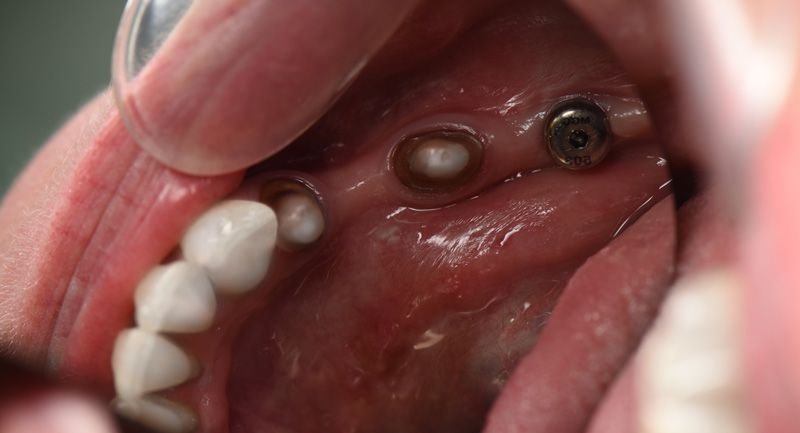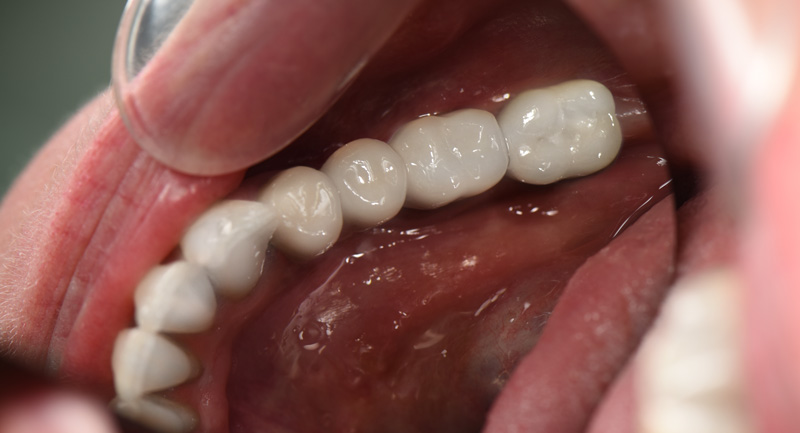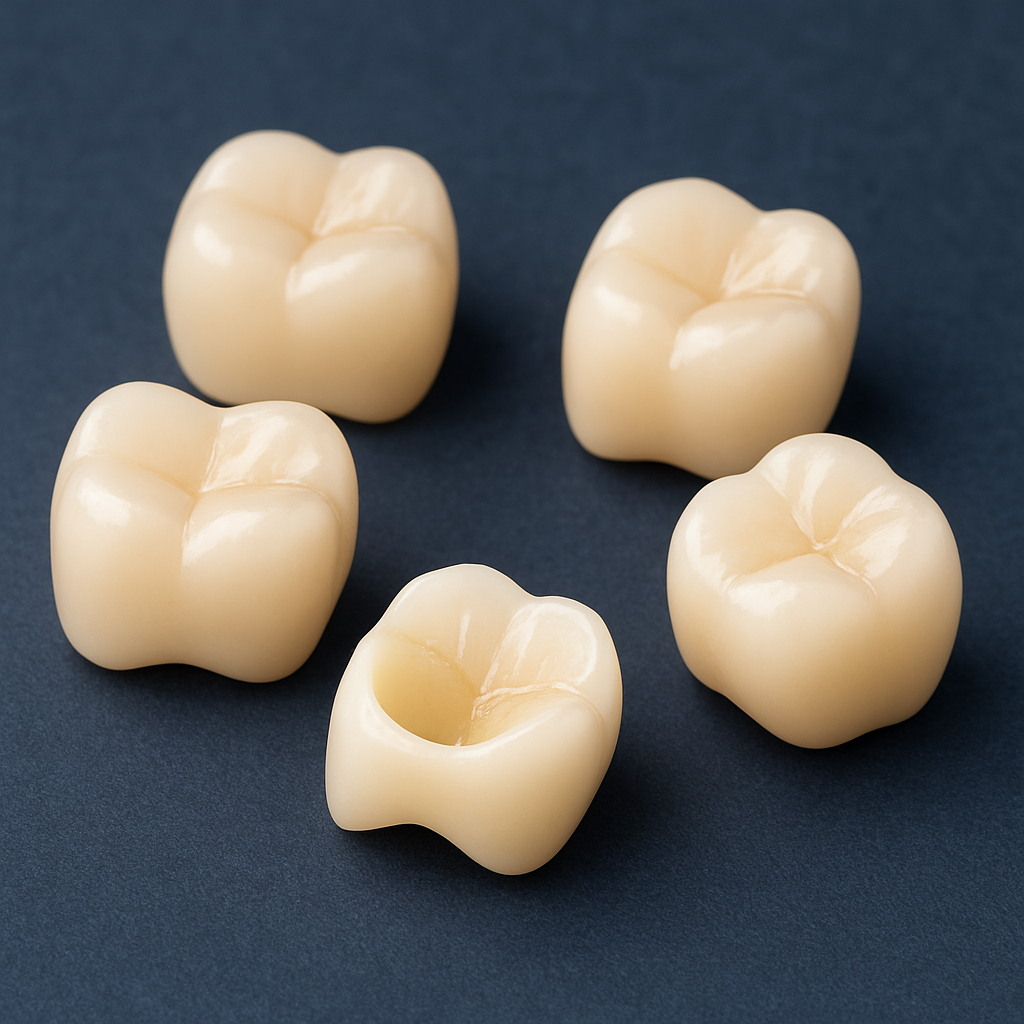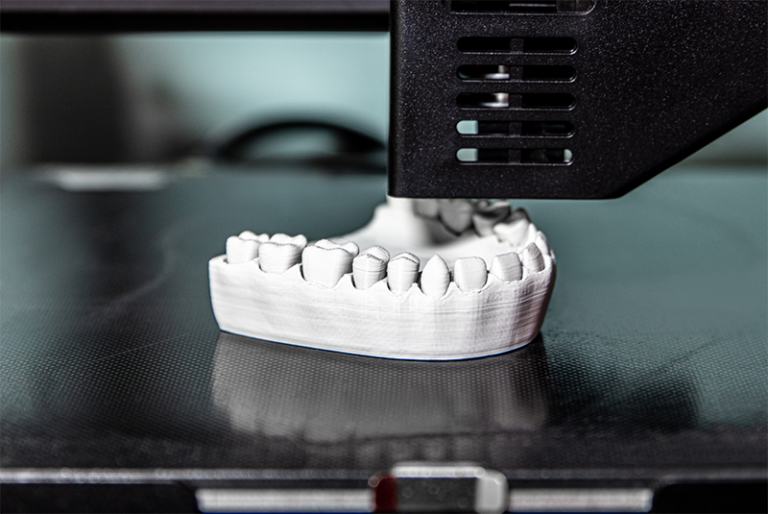Your Smile, Perfect Again
Dental Crowns
Why Choose Dental Crowns?
- Restoration of chewing function – Eat and smile without worries!
- Impeccable aesthetics – Modern materials perfectly mimic the appearance of natural teeth.
- Long-lasting protection – Protects damaged or fragile teeth.
- Durability – Solutions that last for many years with proper care.
Dental Crowns
Types
Dental crowns are prosthetic restorations used to cover or replace damaged teeth, ensuring both functionality and the aesthetics of your smile. There are several types of dental crowns, each with specific characteristics. Below is a detailed description of the main types:
1. All-Ceramic Crowns
These crowns are made exclusively from ceramic or porcelain, providing a very natural appearance due to their translucency and color similarity to natural teeth.
Advantages:
- Superior aesthetics, ideal for front teeth.
- High biocompatibility, reducing the risk of allergic reactions.
2. Metal-Ceramic Crowns
These combine a metal framework covered with a layer of ceramic, blending the strength of metal with the aesthetics of ceramic.
Advantages:
- Increased durability and strength, suitable for posterior teeth.
- More affordable compared to other types of crowns.
3. Zirconia Crowns
Made from zirconium oxide, these crowns offer an excellent combination of aesthetics and strength.
Advantages:
- High mechanical strength, suitable for any position in the oral cavity.
- Exceptional aesthetics, with no visible metal margins.
4. Full Metal Crowns
These crowns are made entirely of metal (gold, platinum, or alloys), offering exceptional durability.
Advantages:
- Extremely resistant to wear and chewing forces.
- Require removal of less healthy dental tissue.
5. Composite Crowns
Made from composite resins, these crowns are often used as temporary solutions.
Advantages:
- Low cost and quick procedure.
- Acceptable aesthetics for the short term.


Dental Crowns
Frequently Asked Questions

Is getting a dental crown painful?
No, the procedure is not painful. Local anesthesia is used during the treatment to ensure the patient’s comfort. Once the anesthesia takes effect, any discomfort is eliminated, making the process completely pain-free. After the treatment, slight sensitivity may occur, which typically subsides within a few days.
When do you need dental crowns?
- After a root canal treatment: To protect devitalized and fragile teeth from fractures and chewing pressures.
- For teeth with large fillings: In cases where teeth have undergone multiple large restorations, the crown provides additional protection against damage.
- In cases of extensive decay or broken teeth: To restore the function and appearance of severely damaged, broken, or worn teeth.
- After a tooth fracture: If the tooth can be saved, it is treated endodontically and rebuilt with a dental post, over which the crown is applied.
- In partial edentulism treatments: Crowns are used as part of dental bridges to replace missing teeth and provide stability.
- In cases of bruxism: Crowns can protect teeth from excessive wear caused by teeth grinding.
- For covering dental implants: Crowns are attached to implants to restore aesthetic appearance and chewing functionality.
- To improve aesthetics: They are used to correct shape or color anomalies of teeth, especially when other methods, such as whitening, are ineffective.
What is the typical duration for placing a dental crown?
The duration of the dental crown placement process varies depending on the complexity of the case and the technology used. Typically, two or three appointments are required over 1-2 weeks, but this timeframe can differ in certain situations:
1. First Appointment:
- Assessment of the teeth and initial consultation.
- Preparation of the tooth by shaping it to create space for the crown.
- Taking an impression or performing a digital scan.
- Applying a temporary crown for protection.
2. Second Appointment:
- The final crown, customized based on the impression or scan, is ready.
- Fitting trials are done to check the fit, shape, and color.
3. Third Appointment (Optional):
- If additional adjustments are needed, they are made before the final cementation.
Special Cases:
- If modern technologies like CAD/CAM are used, the crown can be made and placed on the same day, reducing treatment time.
- For dental implants, a healing period of several months is required before the crown can be placed.
These steps are essential to ensure a long-lasting aesthetic and functional result.
What is the typical lifespan of dental crowns?
The lifespan of dental crowns depends on the material used, personal care, and patient habits. Generally, dental crowns can last between 10 and 15 years, but in some cases, they may last even longer if properly maintained.
Factors affecting the durability of dental crowns:
1. Crown material:
- Zirconia crowns: Extremely durable, often lasting over 15 years.
- All-ceramic crowns: Highly aesthetic but may be less wear-resistant in high-pressure areas.
- Metal-ceramic crowns: Offer a balance between strength and aesthetics, with an average lifespan of 10-15 years.
- Full metal crowns: The most durable but less commonly used due to limited aesthetics.
2. Oral care:
- Daily brushing, flossing, and regular dental visits help prevent issues affecting the crown or supporting tooth.
- Avoiding hard or sticky foods reduces the risk of cracks or damage.
3. Patient habits:
- Habits such as teeth grinding (bruxism) can accelerate crown wear.
- Smoking or excessive consumption of staining foods can affect the appearance of materials.
4. Periodic adjustments:
- Dental check-ups and adjustments contribute to prolonging the crown’s durability.
Conclusion: With proper care and healthy habits, dental crowns can provide a durable, functional, and aesthetic solution for many years. If you notice signs of wear, sensitivity, or other issues, it is important to consult your dentist for evaluation.
Dental Crowns versus Veneers
Dental crowns and dental veneers are two dental solutions used to improve the aesthetics and functionality of teeth, but they have different purposes and applications. Here is a detailed comparison:
1. What are they and when are they used?
Dental Crowns:
- They are prosthetic restorations that completely cover the affected tooth, from the gum line to its tip.
- Used for:
- Repairing severely damaged teeth (extensive decay, fractures).
- Protecting devitalized teeth (after root canal treatments).
- Restoring the function and aesthetics of worn or weakened teeth.
- Covering dental implants or creating dental bridges.
Dental Veneers:
- They are subtle restorations in the form of thin ceramic or composite shells applied only to the front surface of the tooth.
- Used for:
- Correcting aesthetic imperfections such as stains, irregular shapes, or minor misalignments.
- Improving the smile by altering the color or shape of the teeth.
2. Level of invasiveness
- Dental Crowns: Require removing a larger amount of dental tissue to make space for the crown. This makes them more invasive but necessary in severe cases.
- Dental Veneers: Minimally invasive, involving the removal of a very thin layer of enamel (about 0.3-0.5 mm). In some cases, no tooth preparation is needed at all.
3. Durability
- Dental Crowns: Last between 10-15 years or more, depending on material and care. They are more durable than veneers since they cover the entire tooth.
- Dental Veneers: Have a lifespan of about 7-10 years, but are more prone to cracks or detachment if exposed to excessive forces.
4. Materials used
- Dental Crowns: Zirconia, all-ceramic, metal-ceramic, or full metal.
- Dental Veneers: Usually made of ceramic (for superior aesthetics) or composite resin (a more affordable option).
5. Functionality versus aesthetics
- Dental Crowns: Are both aesthetic and functional, ideal for teeth requiring full restoration. They solve structural and functional problems.
- Dental Veneers: Primarily intended for aesthetic improvement and do not offer significant protection against intense chewing forces.
6. Costs
- Dental Crowns: Costs can be higher, depending on the chosen material and treatment complexity.
- Dental Veneers: Usually more affordable per tooth, but since they are used on multiple teeth for aesthetic purposes, the total cost can increase.
When to choose dental crowns or veneers?
| Situation | Recommendation |
|---|---|
| Severely damaged or fractured teeth | Dental Crowns |
| Devitalized teeth (after root canal treatment) | Dental Crowns |
| Minor aesthetic anomalies (color, shape) | Dental Veneers |
| Severe wear or impaired functionality | Dental Crowns |
| Superior aesthetics for front teeth | Dental Veneers |
Conclusion:
Dental crowns are the ideal solution for teeth with structural or functional issues, while dental veneers are the perfect choice for those seeking a minimally invasive aesthetic improvement. The correct choice depends on the clinical situation and patient goals, making a detailed consultation with the dentist essential.
Dental Crown versus Implant
Dental crowns and dental implants are dental solutions used to restore teeth, but they have different purposes and applications. Here is a detailed comparison between the two:
1. What they are and when they are used
Dental Crown:
- It is a prosthetic restoration used to cover a damaged or weakened tooth.
- Applied to teeth that can still be saved but require additional protection or aesthetic restoration.
- It can also be used to complete a dental implant.
Dental Implant:
- It is an artificial root made of titanium or zirconia, inserted into the maxillary or mandibular bone.
- Used to replace missing teeth, providing a stable support for crowns, bridges, or dentures.
2. Structure and function
Dental Crown:
- Covers only the visible part of the tooth (natural crown or post).
- Its role is to protect, restore functionality, and improve the aesthetics of an existing natural tooth.
Dental Implant:
- Replaces the entire tooth structure, including the root.
- The implant provides stability and support for crowns or dental bridges, fully integrating into the bone.
3. Procedure
Dental Crown:
- Performed in 2-3 sessions:
- Preparation of the natural tooth.
- Taking an impression or digital scan.
- Fixing the final crown.
- Usually applied to natural teeth or on a post for devitalized teeth.
Dental Implant:
- The procedure involves multiple stages and can take several months:
- Insertion of the implant into the bone and healing period (osseointegration).
- Attachment of the prosthetic abutment.
- Fixing the crown on the implant.
4. Durability
Dental Crown:
- Lifetime is typically 10-15 years or more, depending on material and care.
- May require replacement if wear or issues with the supporting tooth occur.
Dental Implant:
- The implant itself has a lifespan of 20+ years or even lifetime with proper care.
- The crown fixed on the implant may need replacement after 10-15 years, similar to regular crowns.
5. Level of invasiveness
Dental Crown:
- Less invasive, requiring only the preparation (shaping) of the natural tooth.
- Does not involve surgery unless a post is necessary.
Dental Implant:
- Invasive procedure involving surgery to insert the implant into the bone.
- The healing period can last between 3 and 6 months, depending on the patient’s condition.
6. Costs
- Dental Crown: Generally more affordable than an implant, but costs vary depending on material (zirconia, ceramic, metal-ceramic).
- Dental Implant: More expensive but offers a long-term solution for missing teeth.
7. When to choose each option?
| Situation | Recommendation |
|---|---|
| Damaged but still existing teeth | Dental Crown |
| Missing teeth | Dental Implant |
| Aesthetic and functional necessity | Both options |
| Compromised tooth root | Dental Implant |
Conclusion:
- Dental crowns are ideal for saving and restoring an existing natural tooth.
- Dental implants are the suitable solution for fully replacing a missing tooth, offering long-term stability and functionality.
The choice between the two depends on the patient’s oral health, clinical situation, and the dentist’s recommendations.
Can dental crowns be distinguished from natural teeth?
In most cases, modern dental crowns are designed and crafted to be nearly indistinguishable from natural teeth. However, this depends on several factors:
1. Material used for crowns
- All-ceramic and zirconia crowns:
These offer the most natural appearance due to their translucency and color similarity to natural teeth. They are ideal for front teeth where aesthetics are essential. - Metal-ceramic crowns:
Although very durable, they may show a visible metal margin at the base of the crown, especially if the gums recede over time. - Full metal crowns:
These do not have a natural appearance and are usually used in posterior areas where aesthetics are less critical.
2. Technology used
- Digital scanning and CAD/CAM design:
Allows the creation of highly precise crowns that perfectly match the shape and color of natural teeth. - Layering technique:
For ceramic crowns, dental technicians can layer materials to mimic the translucency and natural shades of enamel.
3. Color and shape selection
- The crown’s color is chosen based on a shade guide and matched to adjacent teeth.
- The shape and size are customized according to the patient’s facial structure and smile harmony.
4. Crown position
- For front teeth: Special attention is given to aesthetics, and crowns are nearly impossible to distinguish from natural teeth.
- For back teeth: Since these areas are less visible, crowns are designed more for function than appearance, but differences are rarely noticeable.
5. Personal care
- A well-maintained crown retains its natural appearance for a long time.
- Habits such as smoking or excessive coffee consumption can stain natural teeth, which may accentuate differences compared to crowns.
Conclusion:
With modern materials and technologies, dental crowns can look extremely natural. When crafted by an experienced dentist and properly customized, they blend harmoniously into the patient’s smile, making the difference almost imperceptible.

Book your visit with
DrCiobanu
Do you have an emergency? Please fill out the form below promptly to access top-quality services tailored to your needs. We continually optimize our processes to provide you with a smooth and efficient experience.

Dental Crowns
Prices
We offer the option to pay for your treatment in interest-free installments over six months through Easy Credit.
- Dental Crowns




